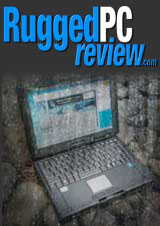« Palm and Windows Mobile and how the iPhone really changed everything | Main | The dangers of product photography »
June 30, 2009
Where rugged computers come from
Where do rugged computers come from? Not always where you think. In an increasingly global marketplace the old business model of companies designing, making, selling and servicing their products is increasingly going by the wayside. These days, it's more likely that one company thinks of a product, hires another to design it, has it built by a third, a forth one is marketing and selling it, and a fifth one does the service. As a result, it's becoming pretty difficult to figure out who does what, and where the computers we buy and use are actually coming from.
For us here at RuggedPCReview.com, this global marketplace often means a good deal of detective work when trying to figure out who actually makes a machine. You could argue that a computer is a computer and it's not really important who designed and manufactured it. That may be so for some, but I really like to know who did the design, who specified the features, and where manufacturing took place. It'd be silly to praise a company for their excellent design when, in fact, all they did was strike a deal with a Chinese manufacturer and put their label on the machine. There's nothing wrong with that, and many companies do a great job searching for good products that they then sell and service in the US. But it'd still be good to know the actual origin and background of a machine.
What are some of the different business models?
- There are resellers that sell machines from other companies.
- There are distributors which carry machines from a variety of sources and often put their own names on the machines.
- There are vendors and system integrators that sell value-added third party machines under their own name. They may or may not have exclusive arrangements with their supplies.
- There are companies that have their own engineering resources and jointly develop machines with Taiwanese or Chinese manufacturers.
- There are companies that design their own machines, but have them built by a Taiwanese or Chinese contract manufacturer.
- And finally, there are those who still design and manufacture their own machines.
However, it doesn't end there. Some of the Asian manufacturers have their own relationships and interconnections. As a result, we've seen machines where the top part came from one Asian company and the bottom part from another. We've seen machines seemingly made by Taiwanese manufacturers also being marketed by Chinese companies, apparently under reseller agreements (by and large we assume that machines are made in countries with lower manufacturing costs and marketed or re-sold in countries with higher costs). It can get really confusing.
There are also an awful lot of vendors out there, some of which we never heard from. This morning, for example, I came across Chinese Evoc Group, which has been around since 1993 and makes a large variety of rugged, embedded and industrial computers and components, including some interesting looking panel PCs and rugged notebooks (check the Evoc JNB-1404 and Evoc JNB-1502 rugged notebooks).
Does it even matter where all those computers come from? Probably not to consumers. Whether the Dell or HP notebook at OfficeMax is actually made by Quanta or by Wistron hardly matters (though it really concerns me that apart from CPUs, some other chips and software, almost nothing is made in the US anymore). All those Taiwanese OEMs are top notch, and an increasing number of the Chinese ones as well. It does matter to us, though.
Knowing, and reporting on, all those lesser known Asian OEMs means finding the hidden gems, the companies whose products we'd love to see on the US market. Covering them may lead to OEM deals with US and European companies, and such relationships can be win-win arrangements for all involved. Our feedback may also help them adjust their products for the US and other Western markets that often have different values, priorities and expectations. In that sense, I hope that we at RuggedPCReview.com can be a clearinghouse and conduit of information.
Posted by conradb212 at June 30, 2009 7:28 PM

















